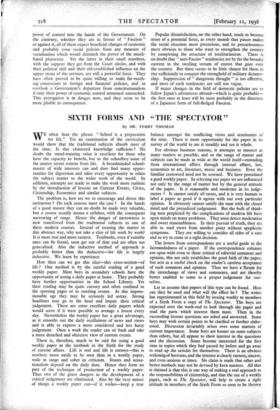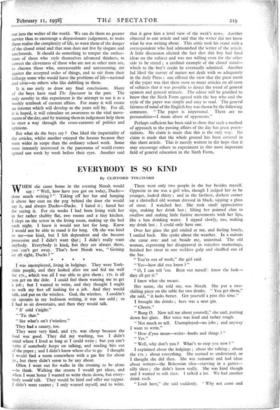SIXTH FORMS AND "THE SPECTATOR "
By DR. TERRY THOMAS
WE often hear the phrase " School is a preparation for life." Yet an examination of the curriculum would show that the traditional subjects absorb most of the time. Is this cloistered knowledge sufficient ? No doubt the mind-training value is excellent for those who have the capacity to benefit, but to the schoolboy some of the matter seems remote from life. A broadminded school- master of wide interests can and does find many oppor- tunities for digression and takes every opportunity to relate the subject matter to the wider work of the world. In addition, attempts are made to make the work more realistic by the introduction of lessons on Current Events, Civics, Citizenship, Economics and similar subjects.
The problem is, how are we to encourage and direct this endeavour ? Do such courses meet the case ? In the hands of a good master they can no doubt be made very valuable, but a course usually means a syllabus, with the consequent narrowing of range. Hence the danger of narrowness is now transferred from the traditional subjects to one of these modern courses. Instead of treating the matter in this abstract way, why not take a slice of life week by week? It is more real and more earnest. Textbooks, even if suitable ones can be found, soon get out of date and are often too generalised. Also the inductive method of approach is probably better than the deductive—for life is largely inductive. We learn by experience.
How then can we get this slice—this cross-section—of life ? One method is by the careful reading of a good weekly paper. Most boys in secondary schools have the opportunity of seeing a daily paper at home. They probably have further opportunities in the School Library. Yet their reading may be quite cursory and often confined to the sporting pages or to startling events. At this impres- sionable age they may be seriously led astray. Strong headlines may go to the head and impair their critical judgement. There are some excellent daily papers which would serve if it were possible to arrange a lesson every day. Nevertheless the weekly paper has a great advantage, as it smooths out the daily oscillations of news and views and is able to express a more considered and less hasty judgement. Once a week the reader can sit back and take a more detached and objective view of current events.
There is, therefore, much to be said for using a good weekly paper as the textbook in the Sixth for the study of current affairs. Life is real and life is earnest—this is nowhere more easily to be seen than in a weekly paper, wide in range and sober in criticism. Stunts and sensa- tionalism depend on the daily dose. Hence they form no part of the technique of production' of a weekly paper. Thus two of the grave dangers to the development of a critical judgement are eliminated. Also by the very nature of things a weekly paper can—if it wishes—keep a true balance amongst the conflicting views and sentiments of the time. There is more opportunity for the paper in its survey of the world to see it steadily and see it whole.
For obvious business reasons, it attempts to interest as many readers as possible, and so the range of matter and subjects can be made as wide as the world itself—extending from international affairs through internal affairs, law, economics to art, literature, music and business. Even the familiar crossword need not be scorned. We have postulated a good weekly paper. In selecting our paper we are influenced not only by the range of matter but by the general attitude of the paper. Is it reasonable and moderate in its judge- ments ? It cannot satisfy all tastes, and it is very human to label a paper as good if it agrees with our own particular opinion. It obviously cannot satisfy the man with the closed mind and the prejudiced judgement. But the bulk of think- ing men perplexed by the complications of modern life have open minds on many problems. They soon detect moderation and sweet reasonableness. In their pursuit of truth, they are able to read views from another point without apoplectic symptoms. They are willing to consider all sides of a case and so try to come to a right decision.
The letters from correspondents are a useful guide to the fairmindedness of a paper. If the correspondence columns are open wide even to those critical of editorial comment and opinion, this not only establishes the good faith of the paper, but acts as a useful check on the reader's careless acceptance of such comment and opinion. Thus we have a-forum for the interchange of views and comments, and are thereby better enabled to come to a proper judgement for our- selves.
Let us assume that papers of this type can be found. How can they be used and what will the effect be ? The writer has experimented in this field by issuing weekly to members of a Sixth Form a copy of The Spectator. The boys are expected over the week-end to look through the paper and read the parts which interest them most. Then in the succeeding lessons questions are asked and answered. Some boys may wish certain points to be clarified or further elabo- rated. Discussion invariably arises over some matters of current importance. Some boys are keener on some subjects than others, but all appear to show interest in the questions and the discussion. Some become interested for the first time in topics which they had passed by before and go away to read up the articles for themselves. There is an obvious widening of horizons, and the interest is clearly earnest, sincere, and even anxious at times. No claim is made that other and better methods may not be devised by keen masters. All that is claimed is that this is one way of making a real approach to the responsibilities of citizenship, and that the use of a weekly paper, such as The Spectator, will help to create a right attitude in members of the Sixth Form so soon to be thrown out into the welter of the world.- We can do them no greater service than.to encourage a dispassionate judgement, to make them realise the complexity of life, to warn them of the danger of the dosed mind and that man does not live by slogans and catchwords. It.should do something to temper the enthus- iasm of those who style themselves advanced thinkers, to correct the cleverness• of those who are not as other men are, to chasten those who, unreasonable and unreasoning, are against the accepted order of things, and to stir from their lethargy some who would leave the problems of life—national and civic—to others who like dabbling in them.
It is too early to draw any final conclusions. Many of the boys have read The Spectator in the past. The only novelty in this experiment is the attempt to use it as a weekly textbook of current affairs. For many it will create an interest which will develop as the years roll by. For all, it is hoped, it will stimulate an awareness to the vital move- ments of the day, and by training them in judgement help them to steer a way through the cross-currents of politics and opinions.
But what do the boys say ? One liked the impartiality of the articles, whilst another enjoyed the lessons because they were wider in scope than the ordinary school work. Some were intensely interested in the panorama of world events spread out week by week before their eyes. Another said that it gave him a level view of the week's news. Another objected to one article and said that the writer did not know what he was writing about. This critic took his stand with a correspondent who had admonished the writer of the article. A little discussion elicited the fact that this boy had fixed ideas on the subject and was not willing even for the other side to be stated ; a cardinal example of the closed mind— which to the boy's credit he eventually admitted. Another lad liked the survey of matter not dealt with so adequately in the daily Press ; one offered the view that the great merit of the paper was that there were so many articles on all sorts of subjects that it was possible to detect the trend of general opinion and general attitude. The editor will be gratified to know that the Sixth Form agreed with 'the boy who said the style of the paper was simple and easy to read. The general fairness of mind of the English boy was shown by the following comment. " The paper is impersonal. There are no personalities—I mean abuse of opponents."
Perhaps sufficient has been said to show that such a method of approach to the passing affairs of the day has great poten- tialities. No claim is made that this is the only way. No claim is made that the whole ground has been covered in this short article. This is merely written in the hope that it may encourage others to experiment in this most important field of general education in the Sixth Form.



















































 Previous page
Previous page